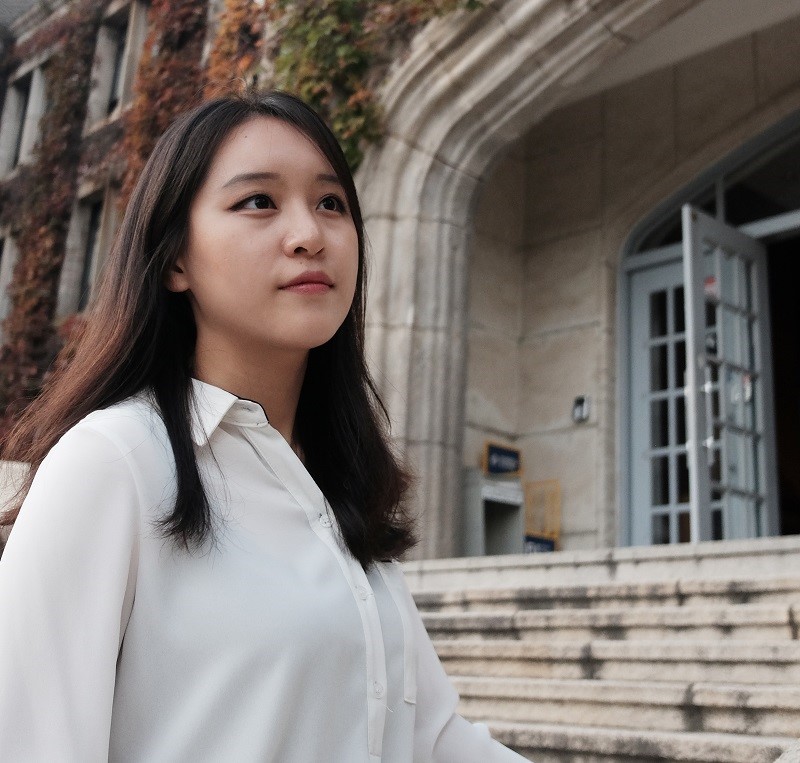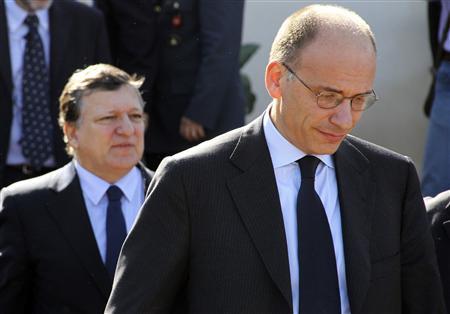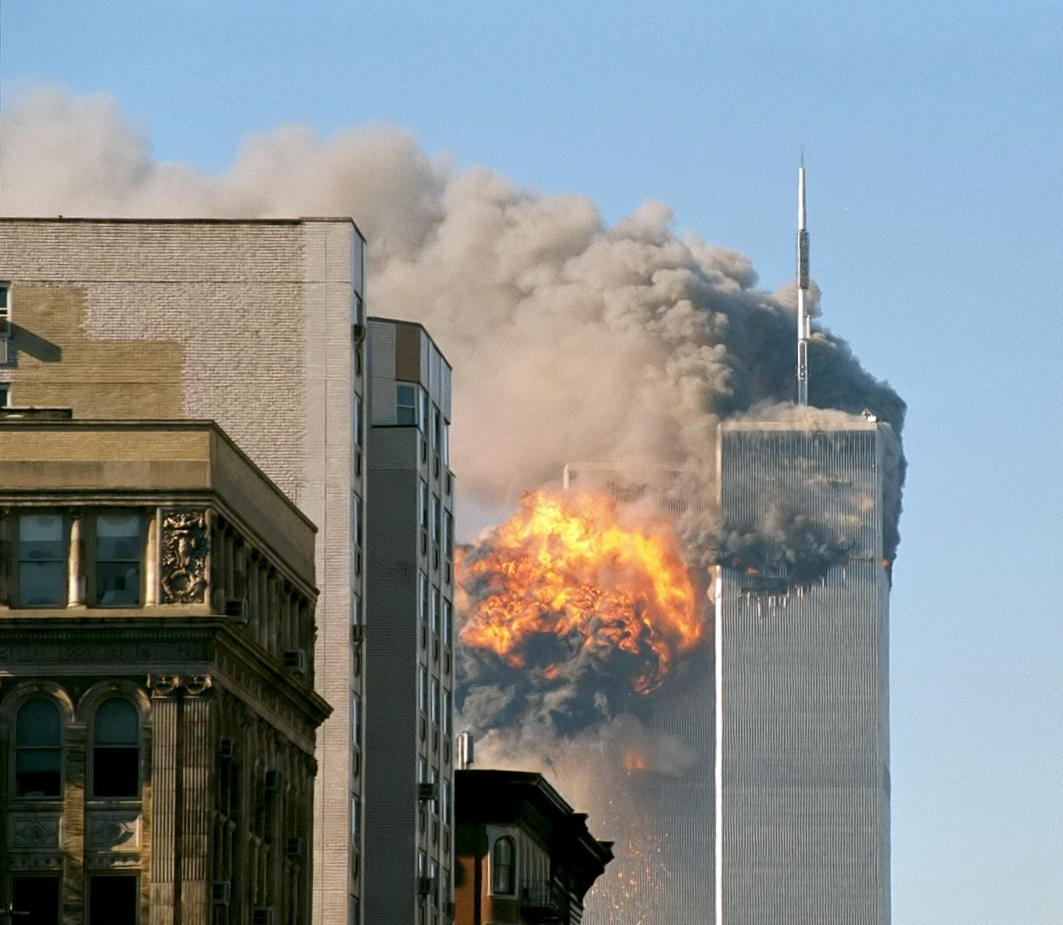Alice Kim was born in Pyongyang, North Korea, to high-ranking officials, who moved with her to China when she was a child, leaving her sister—just a few years older than her—behind. Once in China, her parents decided to defect, a decision that changed Alice’s life—and left her determined to one day be reunited with her sister.
I was born in Pyongyang, the capital of the DPRK, in 1995. My parents were born as privileged elite in North Korea, which is why they were able to attend university. My mother became a general, and then a high-level secretary in Kim Jong-il’s inner circle, in charge of communications with foreign media. In 1996, my father was promoted to a diplomat posting in China. He was in charge of party funds and business dealings between China and North Korea, so he was to move to China to work for Kim Jong-il. But there was one condition for moving abroad: in order for my family to accompany him, one member had to stay behind.
My father had tried to get my sister out by seeing if she could study in China. She got as far as the border [the Yalu River], because I got sick on the way to China. My parents decided to take me instead of my sister so that I could get treatment. My older sister stayed behind. She was just five or six at the time.
When the family is abroad but hasn’t defected yet, it’s the policy of the North Korean government to take the other family member to another relative. But the government doesn’t tell you which relative they go to. Because we defected, my sister might be in a political prison camp. We don’t know if my sister is alive or not.
We were only in China for a short time, because political change in North Korea came quickly. After Kim Il-sung had passed away 1994, Kim Jong-il started the Songun [military first] polices. At that time, the country fell into a famine that lasted for many years. That’s why Kim Jong-il started the policies, because now the military was the first priority. Although my father worked as a diplomat in China, he also felt it was difficult to survive in North Korea. He commented to others that Kim Jong-il’s policies did more harm than good. Then someone disclosed his comments to the authorities. He received direct orders to return to North Korea immediately. At that time, so many North Koreans were being purged. So my father thought he would also be punished. He made up excuses so that he wouldn’t have to return, because he knew he would be punished if he returned. But they caught on.
The Chinese Police were after us, as well as the North Korean police, because they work together. But there was an election in South Korea, and the NIS [National Information Service, South Korea’s intelligence agency] contacted my family. There were few informants on North Korea in the South, so they wanted my parents for their information.
BUZZ: After the NIS contacted your parents, how did you get to South Korea?
Relations between the DPRK and China were still good back then. Because of this, the NIS told my family that they couldn’t help us much while we were in China, but if we got to Macau, they would be able to help us. Macau was still part of Portugal at that time. So my father reached out to other diplomatic missions for assistance. There were different factions within the NIS, but they were working together to try to help us. But, there were people in China’s government that supported North Korea, and they wanted to kill us. One time my father felt a bullet graze his ear, and he realized how dangerous it was. We planned to escape quickly.
There were many times we were almost killed. We rode by car with the help of my dad’s friends, but it was never easy. My father had connections in China, so we could hide during the day. In basements, on trains, or in abandoned houses. At night we moved to other locations. According to my mother, I was very smart when I was young. Even when we were running from the police or avoiding bullets, I never cried. Riding the train was very risky, because if the police searched the train we would be caught. But the chance of them searching the train was low. It was a little more comfortable when we stayed with my father’s friends, because we could often use their car. We camouflaged the cars with packages so it looked like we were moving.
BUZZ: Smart move.
Yes, it looked like there was no one inside. Once we got to Macau, the South Korean government classified us as political refugees and sent us a plane. We flew from Macau to South Korea.
When we arrived in South Korea, there was a chance North Korea could send a spy, or someone to kill us, so we were moved to a “protection house”. It served two purposes: to protect us, but also to watch us and see if we were spies. Then we were moved to a company called Daesung Corporation, in Seoul. This happened because the South Korean government changed. The previous government had made promises to North Koreans, but the new government retracted those promises.
BUZZ: So the protections for North Korean refugees were gone after that election.
Yes, especially for my family. Because they wanted to be friendly with North Korea.
BUZZ: Was this the “Sunshine Policies?”
Yes. We were moved to our place to stay [Daesung Corporation]. For most North Koreans, when they first arrive in South Korea, they have to go to Hanawon, the education system.
BUZZ: Right, it’s the integration centre.
But we didn’t, because we were high-ranking members from the North. They also wanted information from us. Daesung Corporation was where they sent possible spies. From the outside, it looks like an ordinary art company, but it is run by the NIS. Inside they interrogate North Korean refugees. You’re fed through a doggy door. It was like a prison. Our cell was half the size of this room, with one bathroom for the family. There was no door. There was no time allowed for exercise or going outside, so I got sick. I developed dyspepsia [digestive problems] and problems in my heart.
BUZZ: How old were you at this point?
Three. I was allowed to see a doctor, but there was no exercise time at all, so my illness got worse. The South Korean government also took all of my family’s papers during the interrogations. They took our paperwork, our passports, even the last letter we received from my sister while we were in China. They never returned it. They also took all our family photos, but we have one left because my father hid it in his clothes. He had to crumple it up. Everything that happened in the construction company was kept secret. My family asked that the government not reveal details about our family history, because we were worried about my sister.
BUZZ: Does your family at least have a scanned version of the photo?
We scanned it in 2014 [laughs]. We couldn’t afford a scanner until then, because we were living in poverty.
Kim’s family could barely afford to pay rent, and only ate two meals a day. Discrimination against North Koreans meant her parents had difficulty finding jobs, working at landfills and even turning to the street.
BUZZ: With all the discrimination, what has been the hardest thing about growing up in South Korea as a North Korean?
Actually, I found out I was North Korean from my friends. One time, a friend approached me and accused me. He said: “North Koreans like you survive off our South Korean taxes, so you are my slave.” Before then, I was just a good student. My parents worked hard; their only purpose was to earn money to keep our family afloat. My only job was to be a good student and make my parents proud. I knew I was born in North Korea, but I didn’t care about that. After that, my homeroom teacher asked me to stand up in front of the class, and she said: “Everybody, Alice is from North Korea, so let’s have pity on her and treat her nicely.” Everyone knew “she’s from North Korea.” Then they started bullying me. Friends pointed at me, and whispered in the hallway when I moved past them.
BUZZ: They don’t sound like friends.
[laughs] Sometimes, others poured toilet water on my head when I was in bathroom stalls. My parents had to work, so they didn’t have time to pick me up. I just had to walk home alone. One time, my classmates hid a sharp blade in my desk, so I cut my hand reaching for a book. Students were allowed to carry blades for sculpting. I was also often tripped or beaten. This happened so many times that I started to carry a first aid kit with me. I just sat down and started sanitizing myself. My locker would always be full of garbage. Other students would go to the caretaker and tell him they’d left their key in the locker, and the caretaker would open it for them. They had no way of telling whose locker was whose. I was also accused of stealing. There were shoes that everyone had to wear, and whenever I got new shoes someone would steal them. So I never wore nice or new shoes.
[perfectpullquote align=”left” bordertop=”false” cite=”” link=”” color=”” class=”” size=””]If I made a friend, they quickly became a stranger when they found out I was North Korean.[/perfectpullquote]
If I made a friend, they quickly became a stranger when they found out I was North Korean. They enjoyed bullying me with the other classmates. I was ostracized, bullied and isolated because I was born in North Korea in South Korea, and also because I was an elite in North Korea among defectors. I studied hard because that was the only way to beat those kids.
Kim’s determination won her a place at Yonsei University, where she is currently a graduate student studying political science and international studies.
I was naturally interested in political science. It gave me a wide perspective on the world, and I could study many different things. I also think it might help me find my sister.
BUZZ: So your goal is to find your sister.
And bring my family back together again.
BUZZ: A lot has happened recently with North Korea in the news. The Singapore summit, for one. What has it been like for you, watching this happen? What do you think of it?
First of all, I think it’s a positive signal that it is communicating with other countries. And also including South Korea. But I’m skeptical about North Korea’s purpose and their intention, because for many decades, looking at North Korea’s attitude, I think it is only to prolong Kim Jong-un’s power. First, because North Korea doesn’t have terms for its leaders. So Kim Jong-un can have power as long as he’s alive, like his father and grandfather. Maybe for more than thirty years. And second, economic sanctions from other countries became much worse. The sanctions were so deep and extensive, they made North Korea’s economic condition worsen. It was unable to survive on its own. I think that brought Kim Jong-un to the negotiating table. He wants to outperform his father and his grandfather. And finally, it wants to remove its status as an authoritarian country. Kim Jong-un wants North Korea to be seen as normal, and have the same status as other countries.
I support having talks with North Korea, but we should be strict according to international law. Sometimes a negative response—if they violate something, telling them “no”—can be helpful. Having talks is better than no talks at all, but we should have a clear message to North Korea about human rights.
BUZZ: I did want to ask, you just recently got to Canada, but is there anything you think people in general don’t know or don’t understand about North Korea or North Koreans?
I came to Canada because I understood it to be a very diverse and tolerant country. I’ve been outside Korea twice, and this is my first time in a Western country. I was surprised because not many Canadians knew much about North Korea. Many Canadians are interested in North Korea’s politics or human rights abuses, but not many are interested in the struggle of North Koreans outside North Korea. I’m very lucky. For most North Koreans who make it into South Korea, the story is much different. Adapting to South Korean life is very difficult for them. I want Canadians to be aware of the struggle they face. I also want Canadians to know about the real North Korean society. Canadians only know about North Korea from the media, and they think it’s the worst country in the world. But there also some positive things about North Korea and the North Korean people.
BUZZ: As you said there, there are good things about North Korea. If or when North Korea changes, and you can go back—this is a hypothetical question—is there anything you’re looking forward to experiencing, like food, or a place you want to see?
I don’t remember much about North Korea, so I don’t know.
BUZZ: I guess there’s nothing that your parents talk about, or say “Oh, this dish is the best!”
I want to return to Pyongyang and see my old home again. Actually, I did visit North Korea once again, in 2007, to the Mount Kumgang Tourist Region. My parents said that since I’m North Korea, I should get to experience it. My family’s financial condition was not good, but my parents wanted me to see the North Korean side. A student club had a Kumgang Mountain tour, so I was able to go. I got to try some North Korean cuisine, like Pyongyang naengmyeon [Pyongyang cold noodles], but they were $20 USD, so they were very expensive. There was a risk they could have arrested me as a political prisoner when they checked our papers, but luckily nothing happened.
Kim has to work three part-time jobs to support her family, and is a TA at Yonsei. She studies late at night at her office so that she does not incur electricity bills at home. Kim rarely sleeps, and usually eats when she is on the move. She is continuing to work while in Canada, and is assisting Senator Yonah Martin from September to December, after which she will return to Yonsei.
I’m very appreciative of all the people that got me here. It’s only because of them that I was able to make it. Only knowledge and awareness can overcome discrimination. Changing people’s mindsets or biases can take a long time, but even if they won’t go away in this generation, maybe the next generation can overcome it. But there will probably be some discrimination no matter how much knowledge there is. Actually, this is why I’m not a silent North Korean refugee. And this why I applied for this program [the HanVoice Pioneers Project] and am attending graduate school. I want to make change around the world, and at that time I won’t feel little. And I hope this work will bring me back to my older sister.
Disclaimer: Any views or opinions expressed in articles are solely those of the authors and do not necessarily represent the views of the NATO Association of Canada.




